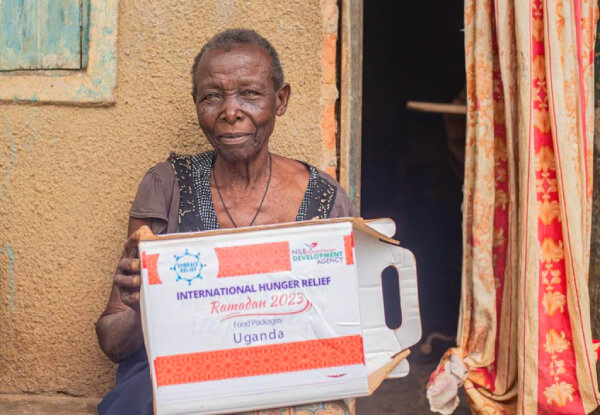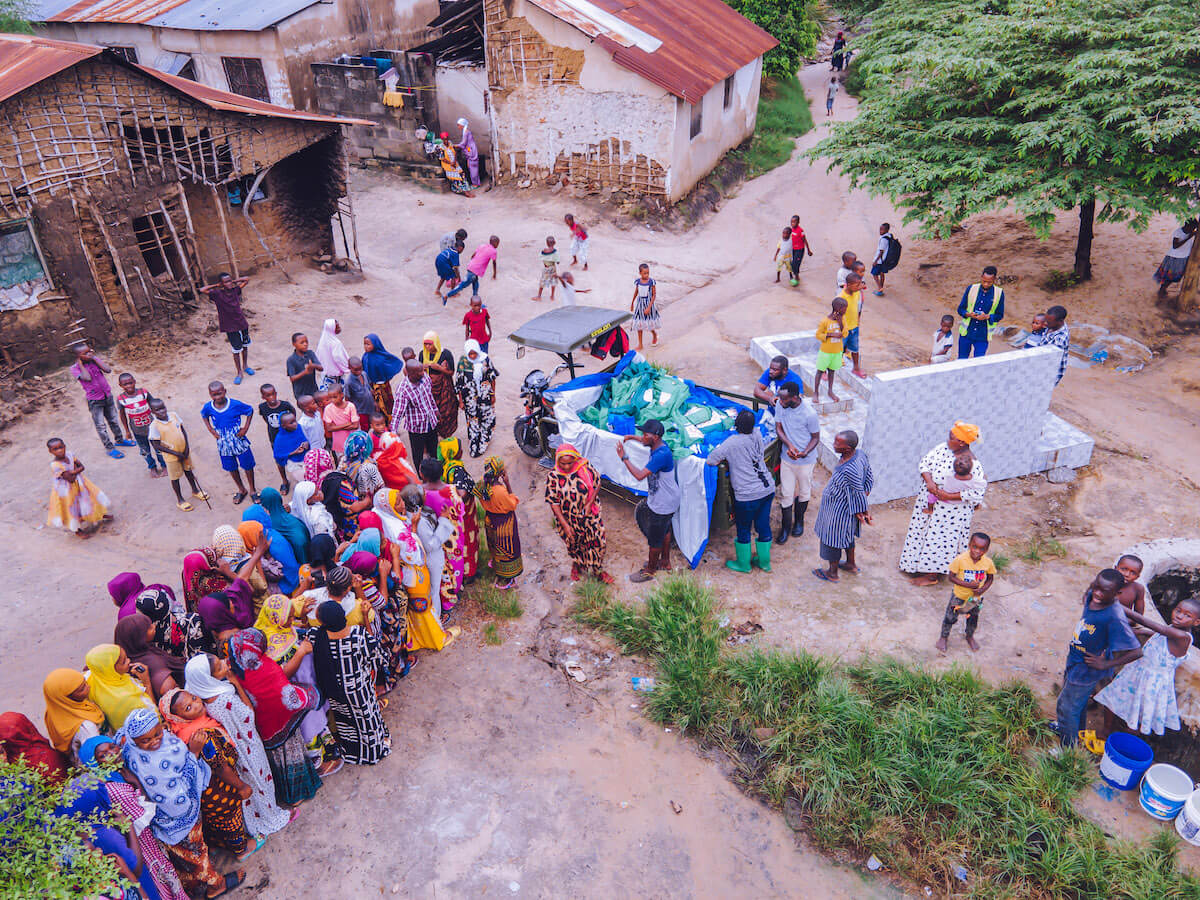The time of Eid al-Adha and the Qurbani sacrifice are nearly upon us. For Muslims around the world, this is a time of faith, sacrifice, and caring about our fellow humans.
Qurbani is a time of sharing our blessings with those less fortunate. Through the sacrifice of livestock, and the sharing of meat with people in need, we can help create stronger communities, healthier people, and a more equitable world.
Perhaps you may have questions about what Qurbani is, what it represents, and how one can fulfill your obligation. We invite you to read on and learn more about this sacred time with this Qurbani FAQ guide:
1. Why do we have to give Qurbani?
Muslims perform Qurbani during Eid al-Adha to emulate the obedience and devotion demonstrated by Prophet Ibrahim, who was commanded by Allah to sacrifice his son Ismail. Ibrahim and Ismail each submitted to Allah’s will and prepared to carry out the sacrifice. But at the last moment, Allah rewarded their faith by substituting a ram for Ismail. In this way, the sacrifice of a livestock animal has been carried down through the ages to serve as an expression of gratitude for Allah’s blessings and a reminder of the importance of submission to His will in the face of trials and tribulations.
Qurbani holds significant spiritual and ethical dimensions, emphasizing the values of compassion, empathy, and generosity towards others, particularly the less fortunate members of society. By participating in Qurbani, Muslims reaffirm their commitment to fulfilling religious obligations and strengthening their connection with Allah and their community.
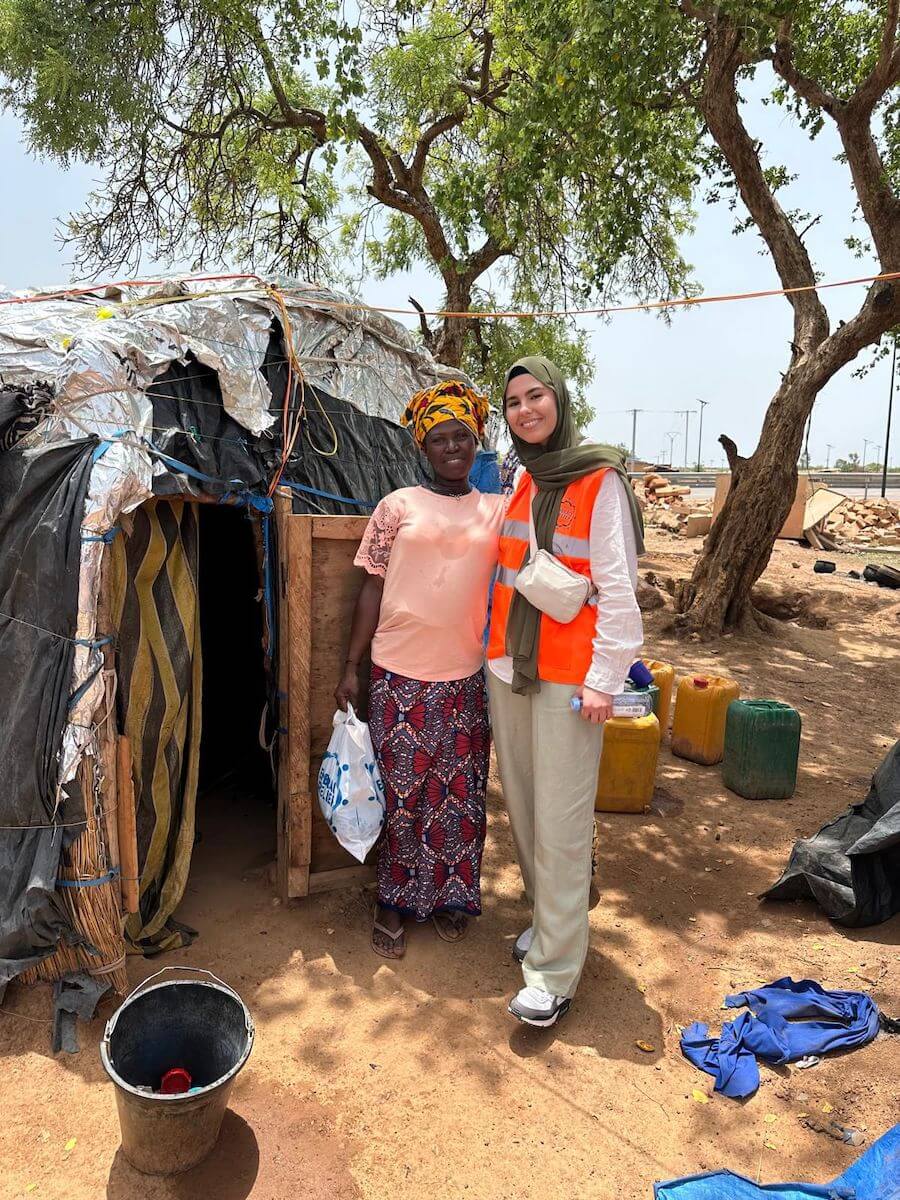
2. When will Qurbani be carried out?
Qurbani is performed on the 10th, 11th, or 12th day of Dhu al-Hijjah, coinciding with the days of Eid al-Adha, which mark the culmination of the Hajj pilgrimage. The Islamic calendar is based on the lunar calendar, meaning that the exact dates of Eid al-Adha will vary each year according to the Western (Gregorian) secular calendar. In 2025, Eid al-Adha is expected to begin at sundown on June 6 and end on June 10.
3. Where can I carry out my Qurbani?
Qurbani can be carried out in various locations, including designated areas on farms, at slaughterhouses, or through authorized organizations that facilitate the proper implementation of Islamic guidelines governing the sacrifice, such as Embrace Relief. The chosen site should adhere to strict standards of animal welfare, ensuring the humane slaughter of the sacrificial animals in accordance with Islamic principles.
Performing Qurbani in such locations not only ensures compliance with religious requirements but also promotes transparency and accountability in the distribution process. Additionally, these sites often provide logistical support and facilities for processing and distributing the meat to needy individuals and communities, ensuring that the spirit of Qurbani is upheld with dignity and integrity.
4. When do you give Qurbani?
You may make a Qurbani donation to an accredited charitable organization at any time. The Qurbani sacrifices themselves are carried out during the three days of Eid al-Adha, following the performance of Eid prayers, which symbolize the completion of the Hajj pilgrimage and the beginning of the festive celebrations. Distribution of the meat takes place immediately after the sacrifice.
5. Who is Qurbani compulsory for?
Qurbani is compulsory for financially stable Muslims who meet specific wealth criteria, typically owning assets beyond their basic needs. If your net wealth exceeds the Nisab that determines whether you owe Zakat, the annual obligatory donation that all Muslims who meet a certain wealth threshold must give, you also must give Qurbani. By fulfilling the duty of Qurbani, Muslims demonstrate their solidarity to those less fortunate, sharing the blessings of Eid al-Adha with all.
6. What animals are eligible for Qurbani?
Animals eligible for Qurbani include sheep, goats, cattle (such as cows or bulls), and camels, so long as they meet age and health criteria specified in Islamic law. Selected animals must be in good health, and are chosen based on their suitability for sacrifice and their ability to provide nourishment to those in need. By adhering to these criteria, Muslims uphold the sanctity and integrity of the Qurbani ritual, ensuring that it serves its intended purpose of expressing gratitude to Allah and benefiting those less fortunate.
Embrace Relief and its worldwide partners guarantee that all animals selected for sacrifice meet strict standards for cleanliness, good health, and size, to ensure that your Qurbani donation reaches communities that need it most.
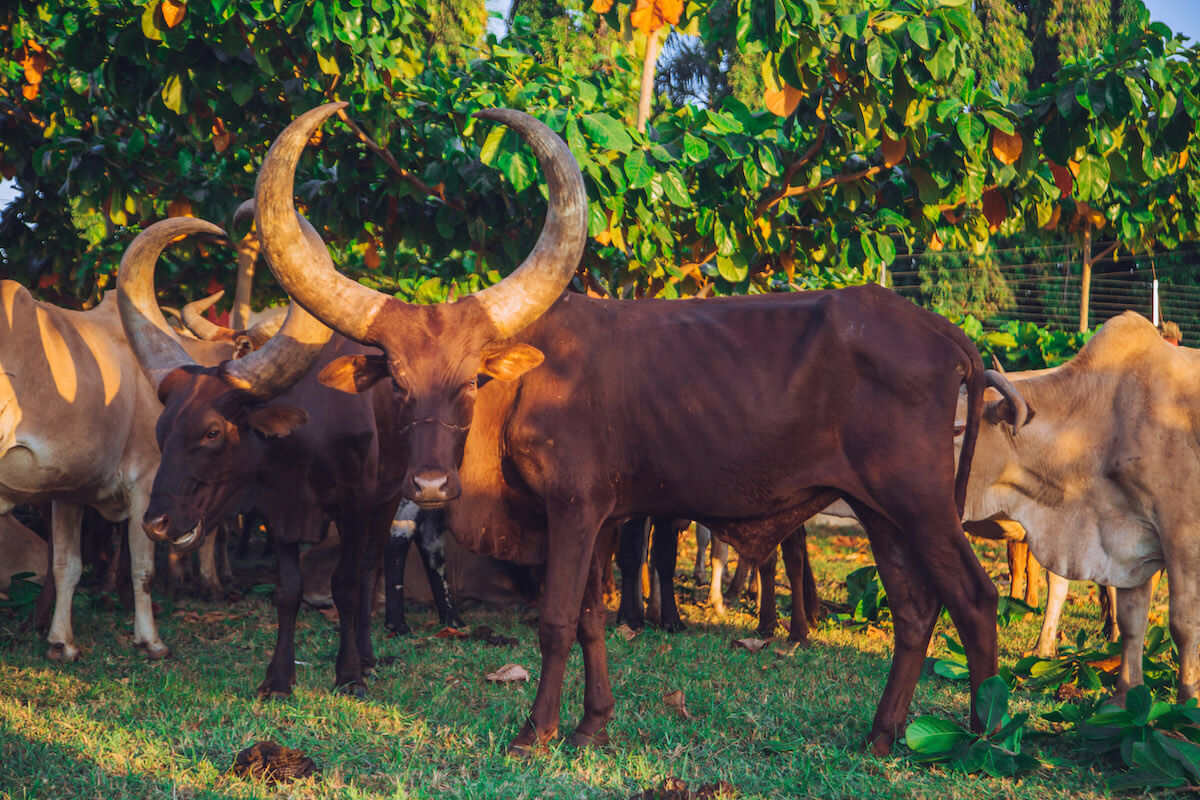
7. How much do I need to donate to meet requirements?
Every able adult Muslim should donate at least one Qurbani share. A Qurbani share is equivalent to the meat from one sheep or goat, or one-seventh of the meat from a larger animal, like a cow or camel. The price of a share will vary depending on the local market price of each animal.
At Embrace Relief, a Qurbani share to be distributed among communities in need in Africa or Asia costs approximately $120.
8. How much meat will a Qurbani share provide?
This total depends on the size and quality of the animal selected for the Qurbani sacrifice; each organization has its own standards. At Embrace Relief, we maintain a strict policy of selecting healthy, high-quality cattle which will provide a minimum of 280 pounds of meat. This means that each $120 donation to Embrace Relief provides a Qurbani share of at least 40, this being one-seventh of the total. Each share, in turn, provides enough meat to distribute 6-pound meat packages, enough to feed a family for nearly two weeks, to six or seven families.
9. Who receives Qurbani?
Traditionally, the meat from each Qurbani share is divided in three ways. One-third of the meat is eaten by the person who has fulfilled their obligation. Another third is meant to be given as gifts to family, friends, and others. The final third should be distributed to charities, orphanages, and people suffering from food insecurity and poverty. This last piece is critical, as it provides a means of sustenance and celebration to those in need, ensuring equitable access to nutritious food. This distribution process is conducted with care and compassion, reflecting the Islamic values of generosity, solidarity, and concern for the welfare of others.
At Embrace Relief, we work with partner organizations in 20+ countries to identify vulnerable communities where access to quality nutrition is lacking. Through these partners, we are able to direct your Qurbani share to a family that needs it.
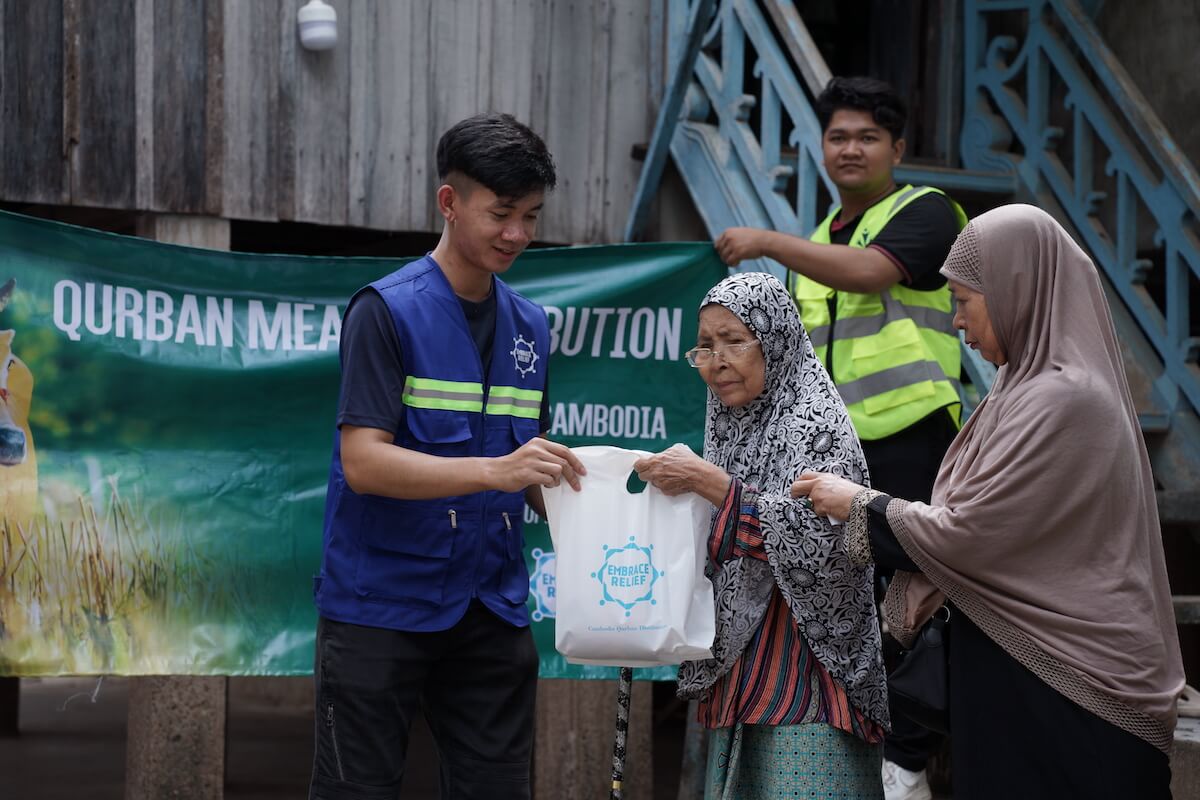
10. How is Qurbani distributed in specific countries, like the United States, or in regions like Africa?
In each country, accredited charitable organizations – such as Embrace Relief – partner with community organizations, mosques, local leaders, and other nonprofit charities to distribute Qurbani meat to those in need. These organizations typically facilitate the purchase, slaughter, and distribution of sacrificial animals on behalf of donors, all within the guidelines of Islamic law.
By working together, these groups can identify the people and families who are most in need of Qurbani meat in a given local community. Successful organizations act transparently and are accountable for ensuring that Qurbani donations reach their intended beneficiaries. You can read about Embrace Relief’s step-by-step process for carrying out your Qurbani by clicking here.
11. Is the meat distributed fresh, cooked, or both?
Qurbani meat is distributed fresh, allowing recipients to prepare it according to their preferences and dietary requirements. Fresh meat ensures that recipients can enjoy the nutritional benefits and flavor of the sacrificial meat while celebrating Eid al-Adha with their families and communities. For many families in need, Qurbani is their best – and sometimes only – opportunity all year to receive high-quality, affordable meat. Delivering the meat fresh also enables many families, if they so choose, to preserve and store it for use for up to a full year.
12. What is the difference between Qurbani and Udhiyah?
These two words are related, but carry different meanings. “Qurbani” is an Arabic word meaning “sacrifice,” and refers to the act of slaughtering an animal as a symbolic expression of obedience and faith in Allah. “Udhiyah” is an Arabic word that refers to the type of animal eligible for sacrifice (goats, sheep, cattle, camels) during Qurbani. Either term may be used in certain parts of the world, but both refer to the religious obligation that Muslims must perform during Eid al-Adha.
13. If I pay for Qurbani on behalf of someone else, will their name be called out at the time of the slaughter?
If you pay for Qurbani on behalf of someone else, their name may be mentioned at the time of the slaughter as a dedication or intention for the sacrifice. While it’s not a mandatory practice, many organizations or individuals may choose to announce the names of donors and beneficiaries as a gesture of acknowledgment and gratitude. This inclusion of names serves to personalize the act of Qurbani and highlight the interconnectedness of the community in fulfilling religious obligations and supporting those in need.
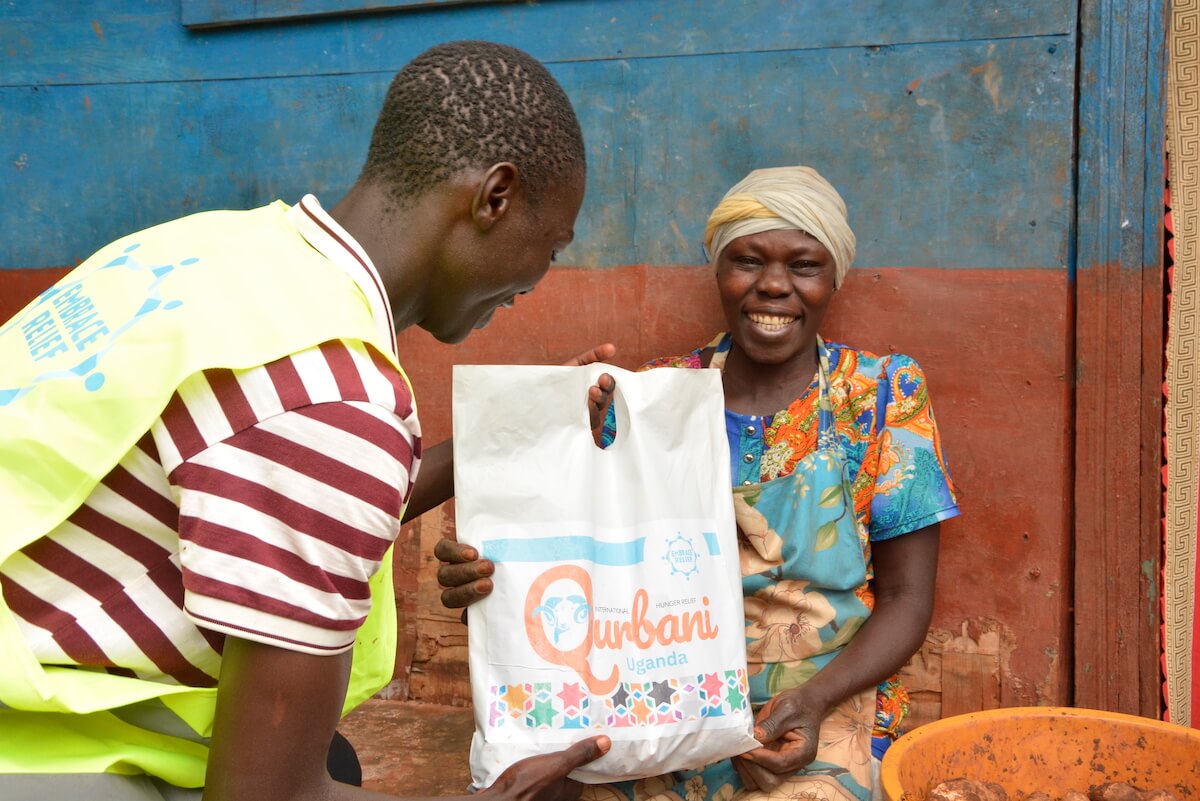
14. Can you do Qurbani in the name of the deceased?
Yes, it is permissible to perform Qurbani in the name of a deceased loved one as a form of ongoing charity (Sadaqah Jariyah) on their behalf. This act allows the deceased to continue receiving blessings and rewards for their good deeds even after their passing. By performing Qurbani on behalf of the deceased, Muslims honor their memory and fulfill a religious obligation while simultaneously benefiting the less fortunate. It’s a meaningful way to commemorate the deceased’s legacy of generosity and compassion in accordance with Islamic teachings.
15. How much does Qurbani cost for each person or family?
The cost of Qurbani varies depending on factors such as the type of animal chosen for sacrifice, its size, and prevailing market rates. Generally, the price range for Qurbani can fluctuate annually due to factors like inflation, demand, and availability of sacrificial animals. At Embrace Relief, the price of a Qurbani share is as low as $120 for distribution in Africa or Asia, or as high as $300 in other regions. It’s essential to prioritize affordability and ensure that the sacrifice is within one’s means while fulfilling the religious obligation of Qurbani.
16. How do I find a worthy charity to give my Qurbani?
There are many terrific, trustworthy charitable organizations who can fulfill your Qurbani obligation. You want to be certain that your gift will reach people in need. The best way to ensure this is to search out charities with a track record of success, transparency, and collaboration with local partners.
For example, we at Embrace Relief are proud to have been able to provide Qurbani meat packages to hundreds of thousands of people in need over the last several years, including more than 165,000 people in 21 countries in 2024. Embrace Relief’s global network enables us to deliver Qurbani meat packages to people suffering from hunger and poverty wherever they exist. That means your Qurbani gift can travel farther, and make an enormous positive impact on many lives.
Give Your Qurbani, Save Lives
We hope you found this guide informative and helpful in aiding your understanding of Qurbani. This is a truly special time of year for all Muslims – a time when we share our blessings with those less fortunate.
If you would like to fulfill your Qurbani obligation, you may do so right here with Embrace Relief by using the donation box below. Simply select where you would like to direct your Qurbani – to Africa/Asia, the United States, or Where Most Needed – and donate today to provide families in need with the nutritious, life-saving meat they need to thrive!
